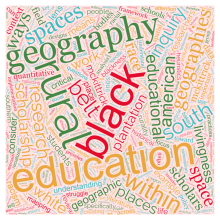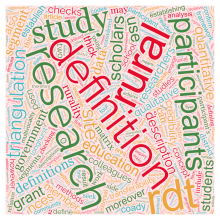

book
In this conceptual article, we posit that Black life matters in the Black Belt of the American South. We connect two current trends in rural educational research—a return to questions of place and sincere attention to race as a crucial conversation in the field—and provide readers with an introduction to Black Geography as a means to inform rural education research. By offering this theoretical lens, we hope to build capacity in the field to take on inquiries related to spatial and educational equity issues related to race in rural education. Taking our queues from McKittrick, we present four areas as lines of inquiry for rural educational research: (a) interrogating quantitative research designs, (b) creating critical topographies of local geography and history, (c) mapping education policy and implementation, and (d) collecting stories about the educational debt owed to Black students. We invite rural educational scholars to consider concepts from Black Geography and employ these lines of inquiry in order to ask better research questions, strengthen research designs, and enhance the contributions drawn from research findings. We view these lines of inquiry as holding the potential for humanizing rural educational spaces by centering Black livingness within the Black Belt.

book
In this article, we introduce a novel framework called Rural Definition Triangulation (RDT) to enhance the categorization of rurality in educational research. This approach leverages the credibility component from Tracy’s “Eight ‘Big Tent’ Criteria for Excellent Qualitative Research,” applying it across qualitative, multimethod, and mixed methods research paradigms. RDT serves as a guide for scholars to authenticate definitions of rurality. We present RDT as a matrix with a vertical axis that represents the continuum of site-centric to participant-centric definitions. The horizontal axis represents the continuum of positivist leaning to interpretivist leaning definitions. We detail the matrix-based structure of RDT, which encompasses four distinct definitional approaches: definition reliance, site definition checking, participation definition checking, and personal description definition. To demonstrate the applicability and effectiveness of RDT, we also provide examples of these four approaches in already published research.


